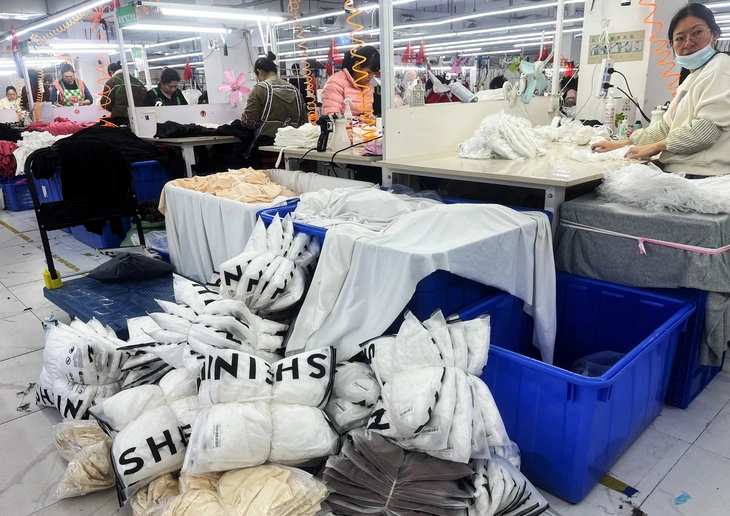
A clothing production line for Shein in Guangdong, China - Photo: REUTERS
Today, May 2, the US officially ended its tax exemption policy for e-commerce orders valued under $800 (de minimis) from China and Hong Kong.
These products will now be subject to tariffs of up to 145%, following US President Donald Trump's decision to impose tariffs last month.
Stop accepting orders
Space NK, a British beauty retailer, has temporarily suspended online orders and shipping to the US "to avoid incorrect or additional charges for customers," it said in a statement on April 30.
Understance, a Vancouver-based company that sells lingerie made in China, also announced it would stop shipping to the US because of the new tariffs, but said it would only return when there was more clarity.
"We went from zero to 145%. That's really unacceptable for businesses and consumers. I've seen a lot of small and medium-sized businesses choose to leave the market (the US) altogether," said Cindy Allen, CEO of global trade consultancy Trade Force Multiplier.
According to Reuters, import costs will vary depending on the shipping method. For goods shipped via the US Postal Service , the tax will be 120% of the value of the goods or $100 per package. The amount is expected to increase to $200 starting in June, according to US Customs and Border Protection guidelines.
Increasing selling price, Temu "circumvents the law"
Meanwhile, retailers who have chosen to remain in the US market have been forced to raise prices. For example, British fashion brand Oh Polly has raised its prices in the US by 20% compared to other markets, and is considering further increases due to high tariffs.
Fast fashion giant Shein reassured US customers on social media Instagram: "Some products may have different prices than before, but the majority of our collection will remain affordable."
E-commerce platform Temu, owned by China's PDD Holdings, is prioritizing the sale of products available in stock in the US.
These products are now featured prominently on the exchange's website. Temu also announced that goods from domestic warehouses will not be subject to import duties.
"Currently, all transactions in the US are done by US sellers and orders are processed domestically," Temu said, while affirming that prices in the US market "remain the same".
However, the stock that arrived before May 2 will also run out. Both Shein and Temu have cut their digital advertising spending in the US in recent weeks to prepare for changes that could impact revenue.
Etsy also told sellers earlier this month that it was making it easier for sellers to update the origin of their products, as taxes will be calculated based on where the product was made, not where it was shipped.
While disruptive to e-commerce, the end of US de minimis on Chinese goods could give an advantage to retailers that don't rely on e-commerce or manufacturing in China.
British fashion retailer Primark said it could benefit from the change: “With prices rising on e-commerce platforms, I wonder if Americans will return to the malls to find better value,” George Weston, CEO of Associated British Foods, Primark’s parent company, told Reuters this week.
Source: https://tuoitre.vn/nha-ban-le-bo-thi-truong-my-khi-buu-kien-nho-bat-dau-bi-danh-thue-temu-lach-luat-20250502195012246.htm



![[Photo] Prime Minister Pham Minh Chinh receives Lao Minister of Labor and Welfare Phosay Sayasone](https://vphoto.vietnam.vn/thumb/1200x675/vietnam/resource/IMAGE/2025/11/11/1762872028311_dsc-2246-jpg.webp)


![[Photo] Chu Noodles - the essence of rice and sunshine](https://vphoto.vietnam.vn/thumb/1200x675/vietnam/resource/IMAGE/2025/11/11/1762846220477_ndo_tl_7-jpg.webp)



















































































![Dong Nai OCOP transition: [Article 3] Linking tourism with OCOP product consumption](https://vphoto.vietnam.vn/thumb/402x226/vietnam/resource/IMAGE/2025/11/10/1762739199309_1324-2740-7_n-162543_981.jpeg)








Comment (0)